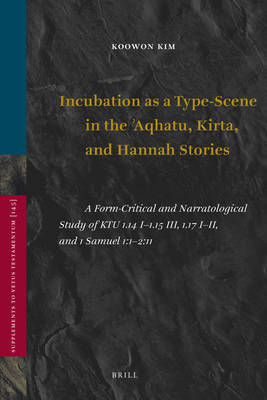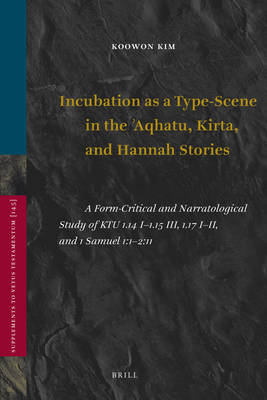
- Afhalen na 1 uur in een winkel met voorraad
- Gratis thuislevering in België vanaf € 30
- Ruim aanbod met 7 miljoen producten
- Afhalen na 1 uur in een winkel met voorraad
- Gratis thuislevering in België vanaf € 30
- Ruim aanbod met 7 miljoen producten
Zoeken
Incubation as a Type-Scene in the Aqhatu, Kirta, and Hannah Stories
A Form-Critical and Narratological Study of Ktu 1.14 I-1.15 III, 1.17 I-II, and 1 Samuel 1:1-2:11
Koowon Kim
€ 296,45
+ 592 punten
Omschrijving
Prior studies of incubation have approached it from a history of religions perspective, with a view to historically reconstruct the actual practice of incubation in ancient Near East. However, this approach has proven unfruitful, not due to the dearth of relevant data, but because of the confusion with regard to the definition of the term incubation. Suggesting a way out of this impasse in previous scholarship, this book proposes to read the so-called "incubation" texts from the perspective of incubation as a literary device, namely, as a type-scene. It applies Nagler's definition of a type-scene to a literary analysis of two Ugaritic mythical texts, the Aqhatu and Kirta stories, and one biblical story, the Hannah story.
Specificaties
Betrokkenen
- Auteur(s):
- Uitgeverij:
Inhoud
- Aantal bladzijden:
- 384
- Taal:
- Engels
- Reeks:
- Reeksnummer:
- nr. 145
Eigenschappen
- Productcode (EAN):
- 9789004202399
- Verschijningsdatum:
- 10/05/2011
- Uitvoering:
- Hardcover
- Formaat:
- Genaaid
- Afmetingen:
- 157 mm x 241 mm
- Gewicht:
- 793 g

Alleen bij Standaard Boekhandel
+ 592 punten op je klantenkaart van Standaard Boekhandel
Beoordelingen
We publiceren alleen reviews die voldoen aan de voorwaarden voor reviews. Bekijk onze voorwaarden voor reviews.








